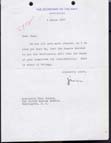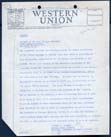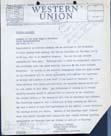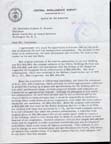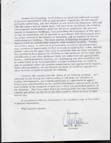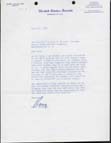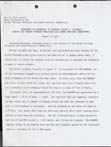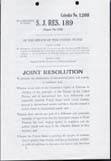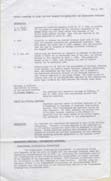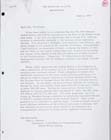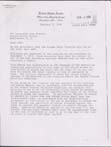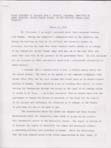
Documents
The Senate Committee on Armed Services, 1947-1996
- A Brief History of the Committee
- Descriptions of Committee Records
- Records of the Committee on Armed Services, 1947-1986 from Guide to the Records of the United States Senate at the National Archives
- Records of Committees Relating to Defense, 1816-1988 from Guide to Federal Records in the National Archives of the United States
- Historical Documents
- Historical Information
- U.S. Senate Website Resources
Descriptions of Committee Records: Historical Documents, 1947-78
When the Truman administration sent a bill entitled the "National Security Act of 1947" to Congress, the Senate Committee on Armed Services confronted an immediate challenge to its jurisdiction. Senator George D. Aiken (R-VT), chairmen of the Senate Committee on Expenditures in the Executive Departments, asserted that the bill should be referred to his committee because it was primarily a government reorganization measure.
On March 3, 1947, Arthur H. Vandenberg (R-MI) ruled in favor of referral to the Armed Services Committee whose chairman, Chan Gurney, had long been a supporter of military unification. This congratulatory note from Secretary of the Navy James Forrestal reflects the administration's relief that the bill would be referred to the more friendly Armed Services Committee. The committee has retained jurisdiction of all bills concerning military organization and has played a notable role in shaping the structure of national security policy since 1947.
Following President Truman's controversial dismissal of General Douglas MacArthur on April 11, 1951, the Senate Armed Services Committee and the Senate Foreign Relations Committee held joint hearings to assess the firing and to conduct a broad inquiry into United States Asian policy. These two telegrams notify MacArthur of the dates and conditions of the hearings. Senator Russell chaired the joint committee and conducted the lengthy hearings in a balanced and dignified manner that did much to diffuse the emotions surrounding the general's dismissal.
The Senate Armed Services Committee was the authorizing committee responsible for oversight of intelligence. The committee discharged this responsibility through a Subcommittee on Intelligence that the full committee chairmen held and that met frequently with the Director of the Central Intelligence Agency. This letter from Director Allen W. Dulles to Chairman Russell reports on the status and cost overruns for the agency's new headquarters.
In 1959, Congress passed legislation requiring an authorization prior to appropriations for aircraft, missiles, and naval vessels. The requirement became effective in 1961 and greatly expanded the role of the Senate Armed Services Committee in the oversight of defense budgets and programs. This letter from committee member Barry M. Goldwater (R-AZ) to Chairman Russell indicates the depth of the committee involvement in the development of the RS-70, a prototype for the bomber that was to supersede the B-52 bomber.
After reports that U.S. ships had been attacked on August 2 and 4 in international waters in the Gulf of Tonkin by North Vietnamese PT boats, President Lyndon B. Johnson sent Congress a special message recommending a joint resolution affirming support of "all necessary action to protect our Armed Forces and to assist nations covered by the SEATO Treaty." At an August 6, 1964 joint meeting of the Senate Foreign Relations Committee and Armed Services Committee, Secretary of Defense Robert S. McNamara presented the administration's version of events that led Congress to pass the Gulf of Tonkin Resolution on August 7, 1964.
John C. Stennis was chairman of the Senate Committee on Armed Services (1969-80) in an era when the Senate Democratic majority insisted on more effective congressional oversight of the executive branch and more accountability from the senior committee chairmen. In a letter to Senate Majority Leader Mike Mansfield (D-MT), Chairman Stennis reports on the Armed Services Committee's activities for the first session of the 91st Congress (1969-70).
The expanding scope of the annual Defense Authorization bills enhanced greatly the power of the Senate Armed Services Committee. Secretary of State Henry A. Kissinger's letter to Chairman Stennis illustrated the impact of the annual Defense Authorization bill on U.S. diplomacy. Secretary Kissinger expressed concern that Senate reduction of troop deployments in Europe and reduction of military assistance for South Vietnam would undercut his diplomatic initiatives.
As the Panama Canal Treaty came before the Senate for ratification in the spring of 1978, a powerful, bipartisan group of senators appealed to Chairman Stennis for support of the companion Neutrality Treaty that guaranteed the United States and Panama the right to defend the canal after December 31, 1999. Their overture to win Senator Stennis' support failed, however, for reasons indicated in his prepared "Floor Statement" of March 16, 1978. Although Senator Stennis did not support the treaty, on April 18, 1978, the Senate approved the Panama Canal Treaty by a vote of 68 to 32.
- Guide to the Records of the U.S. Senate (Record Group 46)
- Guide to the Records of the U.S. House of Representatives (Record Group 233)
- Guide to the Records of the Joint Committees of Congress (Record Group 128)
- Publications of the U.S. Government (Record Group 287)
- Special Collections of the Center for Legislative Archives
